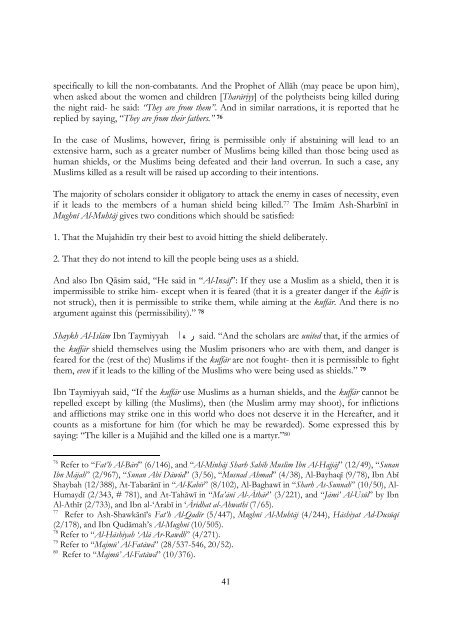the-islamic-ruling-on-the-permissibility-of-self-sacrificial-operations-suicide-or-martyrdom
the-islamic-ruling-on-the-permissibility-of-self-sacrificial-operations-suicide-or-martyrdom
the-islamic-ruling-on-the-permissibility-of-self-sacrificial-operations-suicide-or-martyrdom
Create successful ePaper yourself
Turn your PDF publications into a flip-book with our unique Google optimized e-Paper software.
specifically to kill <str<strong>on</strong>g>the</str<strong>on</strong>g> n<strong>on</strong>-combatants. And <str<strong>on</strong>g>the</str<strong>on</strong>g> Prophet <strong>of</strong> Allāh (may peace be up<strong>on</strong> him),<br />
when asked about <str<strong>on</strong>g>the</str<strong>on</strong>g> women and children [Tharāriyy] <strong>of</strong> <str<strong>on</strong>g>the</str<strong>on</strong>g> poly<str<strong>on</strong>g>the</str<strong>on</strong>g>ists being killed during<br />
<str<strong>on</strong>g>the</str<strong>on</strong>g> night raid- he said: “They are from <str<strong>on</strong>g>the</str<strong>on</strong>g>m”. And in similar narrati<strong>on</strong>s, it is rep<strong>or</strong>ted that he<br />
replied by saying, “They are from <str<strong>on</strong>g>the</str<strong>on</strong>g>ir fa<str<strong>on</strong>g>the</str<strong>on</strong>g>rs.” 76<br />
In <str<strong>on</strong>g>the</str<strong>on</strong>g> case <strong>of</strong> Muslims, however, firing is permissible <strong>on</strong>ly if abstaining will lead to an<br />
extensive harm, such as a greater number <strong>of</strong> Muslims being killed than those being used as<br />
human shields, <strong>or</strong> <str<strong>on</strong>g>the</str<strong>on</strong>g> Muslims being defeated and <str<strong>on</strong>g>the</str<strong>on</strong>g>ir land overrun. In such a case, any<br />
Muslims killed as a result will be raised up acc<strong>or</strong>ding to <str<strong>on</strong>g>the</str<strong>on</strong>g>ir intenti<strong>on</strong>s.<br />
The maj<strong>or</strong>ity <strong>of</strong> scholars c<strong>on</strong>sider it obligat<strong>or</strong>y to attack <str<strong>on</strong>g>the</str<strong>on</strong>g> enemy in cases <strong>of</strong> necessity, even<br />
if it leads to <str<strong>on</strong>g>the</str<strong>on</strong>g> members <strong>of</strong> a human shield being killed. 77 The Imām Ash-Sharbīnī in<br />
Mughnī Al-Muhtāj gives two c<strong>on</strong>diti<strong>on</strong>s which should be satisfied:<br />
1. That <str<strong>on</strong>g>the</str<strong>on</strong>g> Mujahidīn try <str<strong>on</strong>g>the</str<strong>on</strong>g>ir best to avoid hitting <str<strong>on</strong>g>the</str<strong>on</strong>g> shield deliberately.<br />
2. That <str<strong>on</strong>g>the</str<strong>on</strong>g>y do not intend to kill <str<strong>on</strong>g>the</str<strong>on</strong>g> people being uses as a shield.<br />
And also Ibn Qāsim said, “He said in “Al-Insāf”: If <str<strong>on</strong>g>the</str<strong>on</strong>g>y use a Muslim as a shield, <str<strong>on</strong>g>the</str<strong>on</strong>g>n it is<br />
impermissible to strike him- except when it is feared (that it is a greater danger if <str<strong>on</strong>g>the</str<strong>on</strong>g> kāfir is<br />
not struck), <str<strong>on</strong>g>the</str<strong>on</strong>g>n it is permissible to strike <str<strong>on</strong>g>the</str<strong>on</strong>g>m, while aiming at <str<strong>on</strong>g>the</str<strong>on</strong>g> kuffār. And <str<strong>on</strong>g>the</str<strong>on</strong>g>re is no<br />
argument against this (<strong>permissibility</strong>).” 78<br />
Shaykh Al-Islām Ibn Taymiyyah رحمه االله said. “And <str<strong>on</strong>g>the</str<strong>on</strong>g> scholars are united that, if <str<strong>on</strong>g>the</str<strong>on</strong>g> armies <strong>of</strong><br />
<str<strong>on</strong>g>the</str<strong>on</strong>g> kuffār shield <str<strong>on</strong>g>the</str<strong>on</strong>g>mselves using <str<strong>on</strong>g>the</str<strong>on</strong>g> Muslim pris<strong>on</strong>ers who are with <str<strong>on</strong>g>the</str<strong>on</strong>g>m, and danger is<br />
feared f<strong>or</strong> <str<strong>on</strong>g>the</str<strong>on</strong>g> (rest <strong>of</strong> <str<strong>on</strong>g>the</str<strong>on</strong>g>) Muslims if <str<strong>on</strong>g>the</str<strong>on</strong>g> kuffār are not fought- <str<strong>on</strong>g>the</str<strong>on</strong>g>n it is permissible to fight<br />
<str<strong>on</strong>g>the</str<strong>on</strong>g>m, even if it leads to <str<strong>on</strong>g>the</str<strong>on</strong>g> killing <strong>of</strong> <str<strong>on</strong>g>the</str<strong>on</strong>g> Muslims who were being used as shields.” 79<br />
Ibn Taymiyyah said, “If <str<strong>on</strong>g>the</str<strong>on</strong>g> kuffār use Muslims as a human shields, and <str<strong>on</strong>g>the</str<strong>on</strong>g> kuffār cannot be<br />
repelled except by killing (<str<strong>on</strong>g>the</str<strong>on</strong>g> Muslims), <str<strong>on</strong>g>the</str<strong>on</strong>g>n (<str<strong>on</strong>g>the</str<strong>on</strong>g> Muslim army may shoot), f<strong>or</strong> inflicti<strong>on</strong>s<br />
and afflicti<strong>on</strong>s may strike <strong>on</strong>e in this w<strong>or</strong>ld who does not deserve it in <str<strong>on</strong>g>the</str<strong>on</strong>g> Hereafter, and it<br />
counts as a misf<strong>or</strong>tune f<strong>or</strong> him (f<strong>or</strong> which he may be rewarded). Some expressed this by<br />
saying: “The killer is a Mujāhid and <str<strong>on</strong>g>the</str<strong>on</strong>g> killed <strong>on</strong>e is a martyr.” 80<br />
76 Refer to “Fat’h Al-Bārī” (6/146), and “Al-Minhāj Sharh Sahīh Muslim Ibn Al-Hajjāj” (12/49), “Sunan<br />
Ibn Mājah” (2/967), “Sunan Abī Dāwūd” (3/56), “Musnad Ahmad” (4/38), Al-Bayhaqī (9/78), Ibn Abī<br />
Shaybah (12/388), At-Tabarānī in “Al-Kabīr” (8/102), Al-Baghawī in “Sharh As-Sunnah” (10/50), Al-<br />
Humaydī (2/343, # 781), and At-Tahāwī in “Ma’ānī Al-Āthār” (3/221), and “Jāmi’ Al-Usūl” by Ibn<br />
Al-Athīr (2/733), and Ibn al-‘Arabī in ‘Āridhat al-Ahwathī (7/65).<br />
77<br />
Refer to Ash-Shawkānī’s Fat’h Al-Qadīr (5/447), Mughnī Al-Muhtāj (4/244), Hāshiyat Ad-Dusūqī<br />
(2/178), and Ibn Qudāmah’s Al-Mughnī (10/505).<br />
78 Refer to “Al-Hāshiyah ‘Alā Ar-Rawdh” (4/271).<br />
79 Refer to “Majmū’ Al-Fatāwā” (28/537-546, 20/52).<br />
80<br />
Refer to “Majmū’ Al-Fatāwā” (10/376).<br />
41


